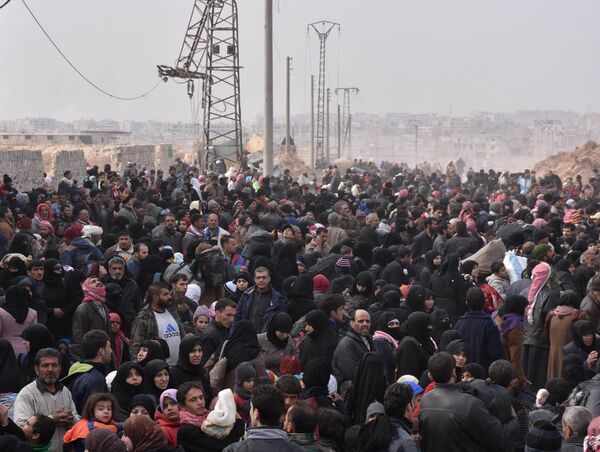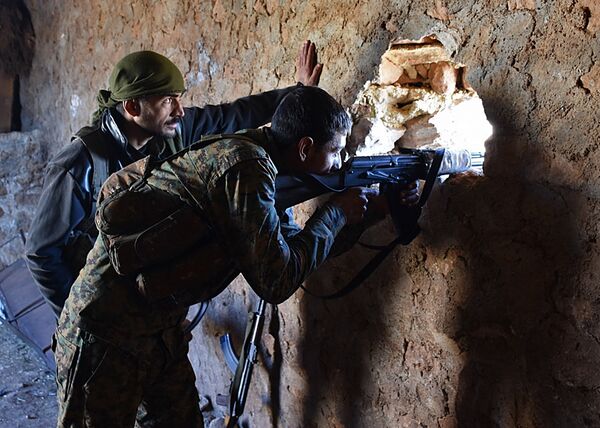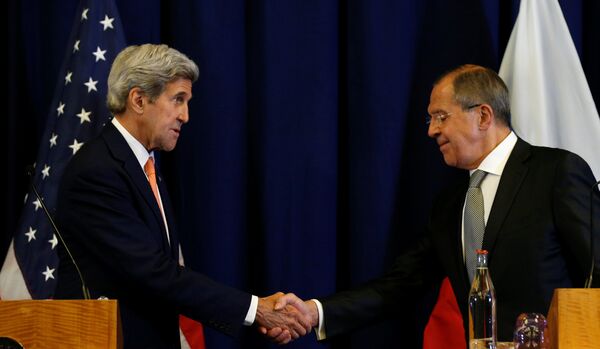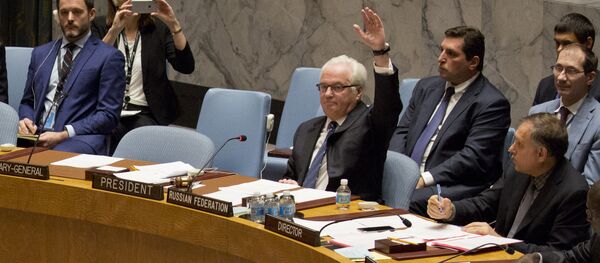"They have withdrawn their document and have a new one. Our initial impression is that this new document backtracks, and is an attempt to buy time for the militants, allow them to catch their breath and resupply," the minister commented.
Eastern Aleppo is currently encircled by government troops fighting to liberate the city from the rebels.

In November, the Syrian Army managed to make significant advances in the eastern part of the city. As a result, the militants lost control over nearly half of the territory.
According to the Russian Center for Syrian reconciliation, by the end of November, the Syrian Army liberated 40 percent of eastern Aleppo from terrorists.
Kerry’s New Proposals
However, during a meeting in Rome on December 2, US State Secretary John Kerry handed over to Sergei Lavrov new proposals on Aleppo. The Russian minister said they complied with Moscow’s approach to the problem.
Russia was ready to immediately send its military experts to Geneva to launch consultations with the American side and designate the terms to liberate Aleppo from terrorists.
According to the new package of proposals, Russian and US experts were expected to come to an agreement on the routes and terms of the withdrawal of militants from the city. The next move would be establishing a ceasefire regime in Aleppo.
The US State Department reluctantly commented on the new attempts by Moscow and Washington to reach an agreement on Syria. US Department of States spokesman Mark Toner said he could not confirm the information about the new talks.
"I’ve seen those comments. We don’t have anything to confirm at this point. Obviously, we’re very seized with the situation, the very dire situation in Aleppo. There was some discussion coming out of the meeting in Rome on Friday that there would be technical talks taking place this week, but we don’t have anything to confirm at this point," Toner said at a press briefing on Monday.
An Attempt to Buy Time?
On Tuesday, Sergei Lavrov called the new attempt by Moscow and Washington to come to an agreement on Syria a "detective story."
In a period of just five days, the US offered a plan, agreed it with Russia, changed its mind and made another proposal contradicting with the initial plan.
"As for consultations on Aleppo, it's a detective story. On December, 2 in Rome, US State Secretary John Kerry asked me to support the document which the Americans gave to us," Lavrov said at a press conference.
The timeline goes like this. On December 2, Kerry handed over to Lavrov a package of proposals on Syria. Moscow welcomed the plan and said it was ready to send military experts for consultations in Geneva. Then, on December 5, Lavrov said that Washington had asked for a delay and set December 7 to begin the expert talks. However, the next day it was reported that the consultations would not start on December 7 because Washington had withdrawn the proposals and was working on a new plan.
"Suddenly, last night we receive from them [the United States] a message that they, unfortunately, will not be able to meet tomorrow [on Wednesday in Geneva], because they changed their minds, their document was withdrawn and now they have a new document, which… changes everything back, and again looks like an attempt to buy time in order to let militants replenish supplies and take a breath," Lavrov said.
Militants Refuse to Leave Aleppo
After Moscow announced a new attempt to negotiate with Washington on eastern Aleppo, militant commanders said they would not surrender and peacefully leave the city.
Speaking to Reuters from Turkey, Zakaria Malahifji of the Fastaqim group said militants fighting in Aleppo had told US officials on Saturday they would not leave.
"The military commanders in Aleppo said 'we will not leave the city.' There is no problem with corridors for civilians to leave, but we will not leave the city'," Malahifji said.
In turn, Moscow said that at the time there was no agreement between Russia and the US on the terms and conditions of militants’ withdrawal from the city.

"Firstly, the fact that the militants have refused says nothing as there's nothing they can refuse yet. The Russia-US agreement has not been formalized yet," Lavrov said.
"Any way, if somebody refuses to leave [Aleppo] on good terms, he will be eliminated as I understand. There is no other way out," he added.
Someone Wants to Undermine Actions of John Kerry
"The same thing happened with our agreements with Kerry on September 9, that have already been reached and came into force, and then the United States began to look for excuses to abandon it, and eventually found a pretext, and have announced that they are out of these agreements," Lavrov said.
"It is difficult to understand who decides there [in Washington], but apparently, there are many people who want to undermine the credibility and actions of John Kerry," the minister suggested.
On September 9, Russia and the US agreed a plan on Syrian settlement. The document included a ceasefire regime and coordination of operations between Moscow and Washington.

On October 3, US State Department spokesperson John Kirby said the US was abandoning bilateral cooperation with Russian on the ceasefire in Syria, leaving only military channels open to prevent collisions between Russia and American aircraft.
In response, the Russian Foreign Ministry called the decisions deeply disappointing. It also said that Washington’s withdrawal from cooperation with Moscow indicated the inability of the US to fulfill its obligations.
Resolution in the UN Security Council
Recently, the United Nations Security Council considered a resolution submitted by Egypt, Spain and New Zealand on the humanitarian situation in Aleppo.
However, the document was vetoed by Russia and China on Monday. Venezuela also voted against it, while Angola abstained. Since the beginning of the Syrian crisis, Russia has voted against a resolution on Syria six times.
Earlier, Sergei Lavrov called the document counterproductive. Moscow warned other countries in advance that it would vote against the resolution.
An immediate ceasefire and a humanitarian pause "which the authors of the resolution would give to the militants will be definitely used by the extremists to regroup and reinforce, thus complicating the liberation of eastern Aleppo," Lavrov said.
He added that the resolution was a provocative move undermining Russia-US efforts on Syrian settlement.








